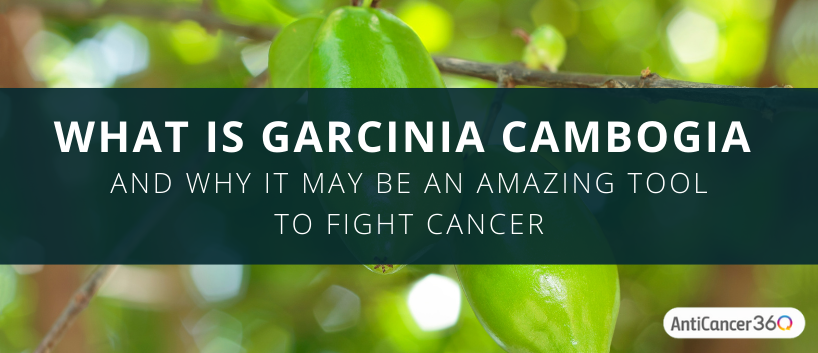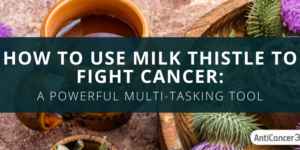It’s essential to fight cancer from multiple angles. And there are many actions you can take on a daily basis to support your body. When you consider things like diet, exercise, rest, and what you put into your body… you want to make choices that fuel and strengthen your body.
Ultimately, there are many strategies that you can use in addition to your oncologist’s treatments. One of these strategies is to incorporate natural substances that have evidence of anticancer benefits, such as garcinia cambogia.
Overall, many natural substances are considered to be very safe and may have demonstrated anticancer benefits. So why not view all of your options to help you fight cancer from every direction? And though it depends on your particular situation… garcinia cambogia may be a helpful addition to your overall treatment plan.
In today’s post, we’re going to explain how garcinia can potentially help you, based on the scientific studies showing its anticancer effects.
What is Garcinia Cambogia?
Garcinia cambogia is a tree native to India and Southeast Asia that produces fruit that looks like a small green or red pumpkin. Garcinia cambogia is sometimes referred to as “garcinia gummi-gutta” or simply “garcinia.” [1]
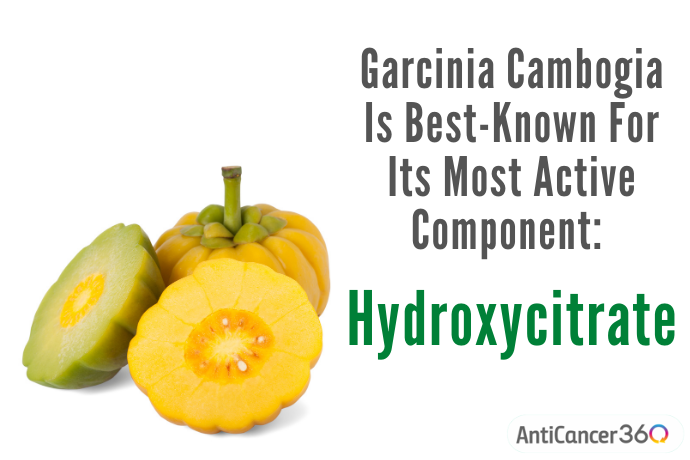
Garcinia cambogia has been used for centuries as a food preservative. The fruit is rich in hydroxycitrate (HCA), the plant’s most active component. In recent years, garcinia’s HCA component is most well-known for being in the original formulation of Hydroxycut, a weight-loss supplement [2].
Studies are mixed on whether or not HCA is safe and effective as a weight-loss product. However, many studies have consistently demonstrated the anticancer effects of garcinia cambogia and its HCA component. Let’s take a more in-depth look at how this natural substance works to help fight cancer.
How to Starve Cancer with Garcinia Cambogia: Blocking Cancer Metabolism
Cancer metabolism refers to the processes that cancer cells use to make energy using available nutrients. So one of the critical cancer-fighting strategies is finding ways to block nutrients from reaching cancer cells… in other words, exploring how to starve cancer.
Decades of research have shown that many natural supplements and repurposed drugs work to block sugar, fats, and proteins from nourishing cancer cells. This strategy weakens the cancer cells and can make them more vulnerable to cancer treatments.
Fortunately, many natural substances show potential in blocking cancer metabolism pathways. One of these substances is garcinia cambogia.
Garcinia Cambogia May Help To Starve Cancer Cells
For many people, monitoring calorie intake, especially from sugar (carbohydrates, “carbs”), can be an essential strategy for general health. Limiting your calories helps ensure that you aren’t taking in more calories than you’re burning, on average. Over time, consuming more calories than you burn leads to weight gain and obesity, which could increase the risk of certain cancers and cancer progression [3],[4].
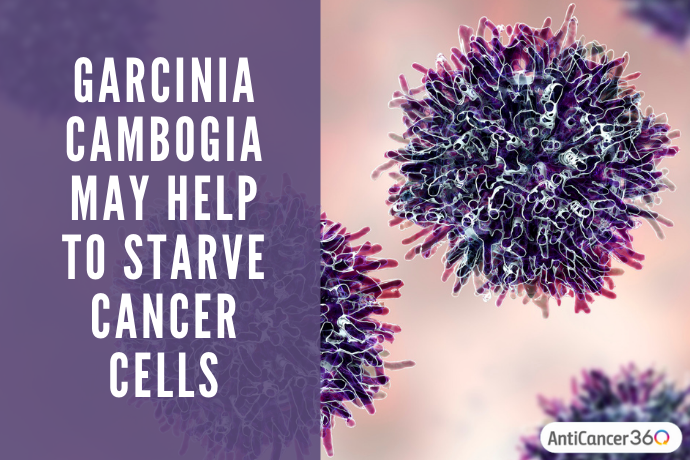
This is especially important for people who are fighting cancer. Cancer cells usually demand high levels of sugar (glucose) to satisfy their high-metabolic needs. Cancer cells also have different processes they can use to convert sugar into energy. Their rapid growth and reproduction require an abundance of energy.
So, when you restrict your calories, especially from carbs, this can theoretically help to starve the cancer cells. And when you limit your carb intake, it keeps your blood sugar and insulin at healthy levels.
Insulin is a hormone made by the pancreas that signals cells to absorb glucose (sugar) from the bloodstream. Insulin resistance occurs when excessive blood glucose diminishes the cells’ ability to absorb blood sugar. This resistance requires the pancreas to secrete more and more insulin into the bloodstream to control blood sugar levels.
Insulin also has direct tumor-promoting effects on cancer cells. Chronically high insulin levels have been linked to colorectal cancer, pancreatic cancer, endometrial cancer, breast cancer, and cancer progression [5].
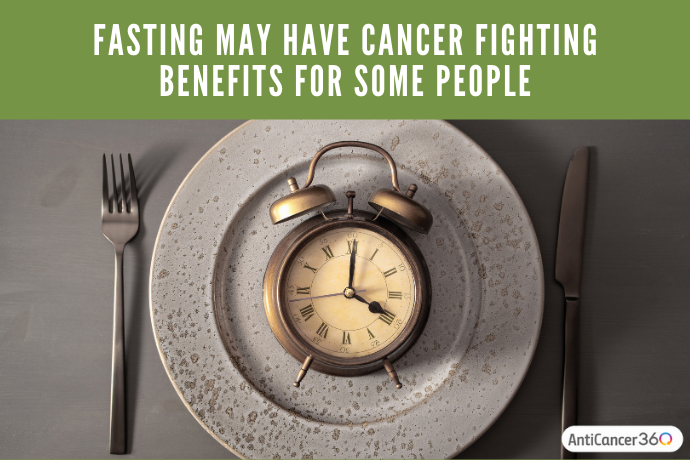
Studies have also shown that fasting (not eating for a prolonged period) may have anticancer benefits. While fasting, levels of sugar and insulin in the blood are also significantly reduced [6].
However, many people who are fighting cancer are already struggling with low energy levels. And some have already lost too much weight. So it’s not practical to ask everyone fighting cancer to restrict their calories or participate in fasting.
The good news is that many natural and pharmacologic products can help mimic or simulate fasting effects. These anticancer substances can block nutrients from reaching and nourishing cancer cells. This weakens cancer cells by limiting their energy sources and making them more vulnerable to other treatments.
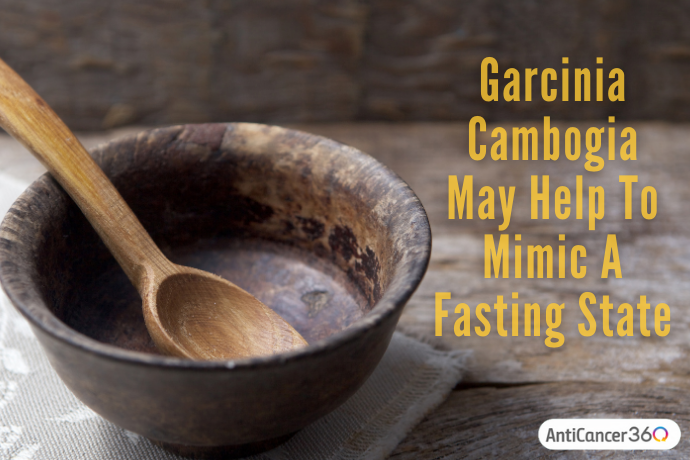
Based on what studies have shown, the effects of garcinia cambogia may help to mimic a fasting state. Also known as metabolic blocking, garcinia cambogia appears to interfere with cancer cell metabolism of fats.
Next, we’ll look at how these metabolic blocking effects have been shown to help fight cancer in several scientific studies.
Garcinia Cambogia May Block Metabolism of Sugar and Fat in Cancer Cells
Garcinia cambogia helps to starve cancer by interfering with the way some cancer cells metabolize sugar and fat. We discussed above how cancer cells often use sugar (glucose) to make energy… but they can also use fats.
Fats (including lipids, fatty acids, and cholesterol) are essential energy sources for all living cells. The metabolism of fats affects cell growth, proliferation, and survival.
Fats are the main component used to construct all cells’ outer layer (membrane), including cancer cells. Consequently, the reprogramming of fatty acid metabolism plays a critical role in cancer progression.
Research shows that the HCA component of garcinia cambogia blocks (inhibits) an enzyme known as ATP citrate lyase. ATP citrate lyase (ACLY) is an enzyme linked to both sugar and fat metabolism. ACLY works in the liver to process carbohydrates and converts them to fats [7].
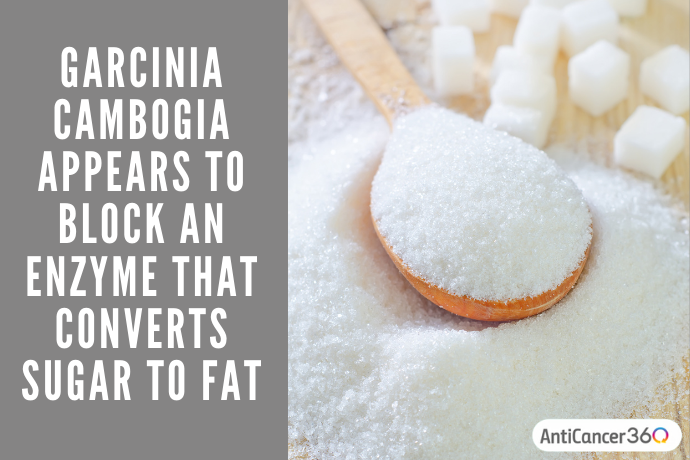
Interestingly, certain cancer cells produce more ACLY enzymes than typically found in healthy liver cells (known as overexpression). Through research, we’ve learned that ACLY enzymes are overexpressed in some forms of cancer, including: glioblastoma, colorectal cancer, breast cancer, non-small cell lung cancer, and hepatocellular carcinoma. So, having a tool like garcinia cambogia that can inhibit these enzymes can potentially decrease the rapid growth and multiplication of these cancer cells [8].
By blocking this enzyme in cancer cells, garcinia cambogia reduces the production of cellular energy, known as ATP. ATP is the chemical form of energy that is used by all living cells. To paraphrase the title of a recent publication, ACLY inhibitors, like HCA, are an anticancer strategy at the crossroads of sugar and fat metabolism [9].
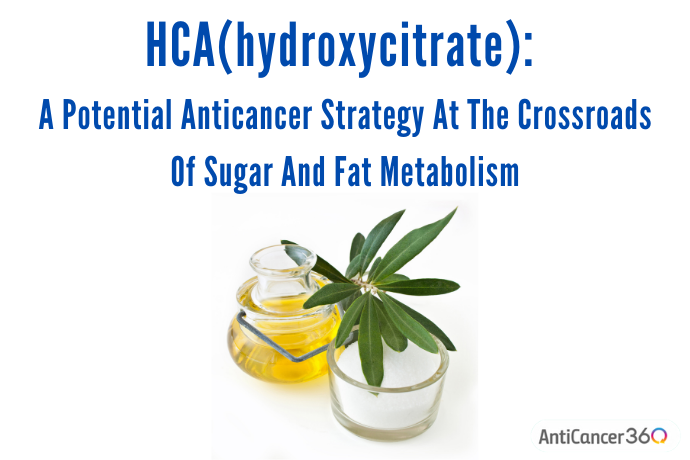
In a laboratory experiment, scientists tested numerous substances to observe their effects on bladder cancer cells in mice. These included various natural compounds and repurposed pharmacologic drugs, including hydroxycitrate (HCA). HCA was shown to reduce the number of bladder cancer cells by up to 60% [10].
Then, these researchers tested different combinations of the most effective substances. They found that the most effective combination was HCA with alpha-lipoic acid, which they coined “Metabloc.” This combination killed more bladder cancer cells than any other combination after 72 hours of treatment.
They repeated this experiment in mice with melanoma and lung cancer and found the same results: HCA and alpha-lipoic acid were shown to be a powerful cancer-killing combination. They also reported no signs of toxicity or side effects in the mice [11].
Garcinia Cambogia May Boost the Cancer-Killing Effects of Chemotherapy
Next, these scientists conducted a clinical trial to evaluate the effects of HCA + alpha-lipoic acid in humans. It was a small study of 11 patients (5 males, 6 females). They were given hydroxycitrate + alpha-lipoic acid in addition to standard chemotherapy for their cancer type and stage. Their HCA dosage ranged from 1,200 mg to 3,000 mg per day. (And their alpha-lipoic acid dosage ranged from 400 mg to 1,200 mg per day.) [12]
The researchers followed up with these patients for variable lengths of time ranging from 2 months to 2 years. Of the 11 patients:
- 5 people experienced a partial response (some of their cancer went away)
- 3 people remained stable (their cancer did not get worse)
- 3 people experienced disease progression (their cancer worsened or spread). One of the patients who experienced disease progression chose to stop her treatments and, unfortunately, passed away.
But overall, 73% of the participants either improved or remained stable when hydroxycitrate + alpha-lipoic acid was added to their treatment plan [13].
During this study, 4 participants reported complaints of side effects, including upset stomach and weight loss. Stomach-related side effects were relieved by adding a proton pump inhibitor, such as pantoprazole (Nexium), or by decreasing the dose of the hydroxycitrate + alpha-lipoic acid supplements [14].
The limitations of the study include its small size and the lack of a control group. (The results were not compared to a group who received standard chemotherapy alone.)
Still, this preliminary trial demonstrated that garcinia cambogia and its HCA component were safe to use concurrently with standard chemotherapy. And the results show the incredible potential utility for garcinia cambogia when fighting cancer from every angle [15].
Similar results have been published in numerous preclinical studies and clinical case reports. Promising results have been reported in mice and humans when garcinia cambogia was used with cisplatin, 5-fluorouracil, gemcitabine, irinotecan, methotrexate, and paclitaxel, among other chemotherapy drugs [16],[17],[18].
Interestingly, a recent study demonstrated that the combination of HCA + alpha-lipoic acid significantly delayed disease progression in mice with lung carcinoma when combined with high-dose metformin. Metformin is a prescription drug commonly prescribed for type 2 diabetes and also has established anticancer effects [19].
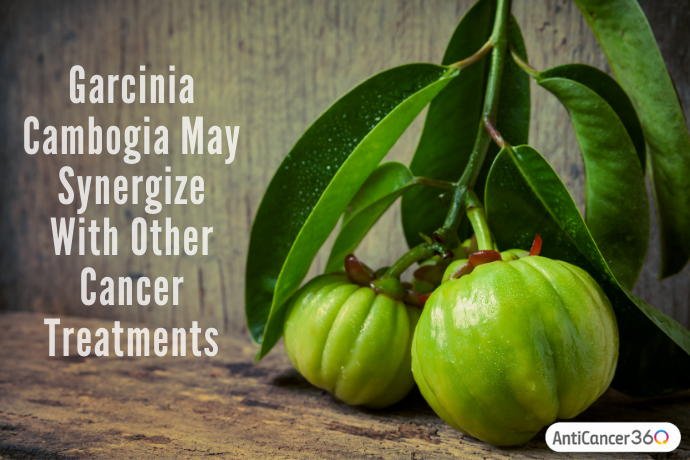
In mice models, these scientists compared the effects of high-dose metformin + HCA + alpha-lipoic acid to the effects of cisplatin, a chemotherapy drug. After 45 to 59 days of treatment, they found that high-dose metformin + HCA + alpha-lipoic acid significantly reduced the average tumor volume compared to cisplatin treatment. The study author stated:
“Combinations of these old and low-cost drugs are two times more efficient than the classic chemotherapeutic agent.” [20]
This finding, albeit in mice, is fascinating and shows the real potential for natural substances like garcinia cambogia to make a difference in fighting cancer.
Scientific analysis of the above studies and case reports confirmed that the HCA component of garcinia exerted its anticancer effects by blocking ACLY, the crucial enzyme for metabolizing sugars and fats.
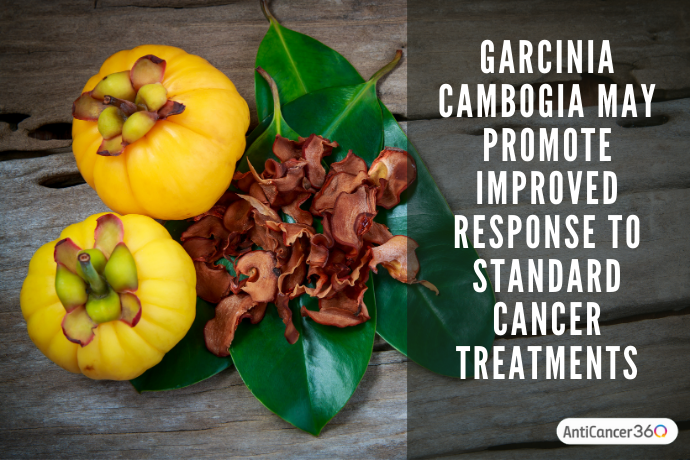
Overall, garcinia cambogia appears to help reduce cancer cells’ ability to convert nutrients into energy and may promote better response to standard cancer treatment.
How To Use Garcinia: Dosages, Side Effects, and Precautions
Dosage
Garcinia cambogia is available in several dosage forms, including capsules, tablets, liquids, and powders. The recommended dosages of garcinia cambogia are based on their HCA component.
When selecting a garcinia cambogia supplement, choose a high-quality product that contains at least 50% HCA. Most studies have used garcinia cambogia dosages of 900 mg to 1,500 mg of HCA per day [21]. Some studies have used higher doses of up to 3,000 mg of HCA per day [22].
For best results, take garcinia cambogia supplements on an empty stomach, 30 to 60 minutes before a meal.
Side Effects
Side effects with garcinia cambogia are usually mild, if they occur, and may include:
- headache
- nausea
- diarrhea
Although rare, serious liver problems have occurred in people who took garcinia cambogia or HCA supplements. Liver failure, hospitalizations, and liver transplants have been reported.
Studies are mixed on garcinia cambogia’s effects on the liver. When these serious liver reactions occurred, the people affected were not a part of a clinical trial. Other factors may have contributed. Several case reports and studies have shown that garcinia cambogia extract is safe, even in high doses (up to 3,000 mg of HCA).
Nevertheless, if you have a history of liver disease, you shouldn’t take garcinia cambogia without first checking with your healthcare provider. And it’s probably best to ask your healthcare provider to check your liver health after adding a garcinia cambogia supplement to your program, and periodically thereafter.
Interactions with Drugs and Supplements
Garcinia has the potential to interact with prescription drugs and other natural supplements. Overall, many unknown drug interactions could happen with garcinia cambogia, especially with chemotherapy and other cancer-related medications. The list below is by no means a comprehensive list of all possible interactions.
- Substances with known risks to the liver. Garcinia cambogia should be used with caution with other medications and supplements that could be harmful to the liver. Here are a few examples of drugs and substances that have been associated with liver problems, particularly with high-dose, long-term use [23]:
- acetaminophen (Tylenol)
- alcohol
- green tea
- kava
- red yeast rice
- statin drugs, such as atorvastatin (Lipitor) or simvastatin (Zocor)
- Certain antidepressants. Although it appears to be very rare, it’s possible that taking garcinia cambogia could increase the risk of serious side effects from certain antidepressants. Garcinia cambogia may raise the levels of a brain neurotransmitter known as serotonin. Serotonin helps to regulate mood among other essential brain functions [24].
Serotonin levels are also increased by most antidepressants, such as serotonin reuptake inhibitors (SSRIs) such as escitalopram (Lexapro). When serotonin levels become too high, a rare but serious condition called serotonin syndrome may occur. Symptoms of serotonin syndrome may include fast heart rate, increased blood pressure, profuse sweating, and tremor, among others.
Because of this, you must consult with your doctor or pharmacist before including any supplements in your program. Please share your updated medication and supplement list with your healthcare provider whenever a new addition is being considered.
Aggressive Integrative Approach to Cancer Treatment with Garcinia Cambogia
Always discuss the risk-versus-benefit potential with your healthcare professional before starting any natural supplement, including garcinia cambogia.
Overall, you can see that there can be many potential benefits to adding a supplement like garcinia cambogia to your anticancer program. When you are fighting cancer, you want every possible weapon in your arsenal.
Among other natural supplements, garcinia cambogia’s potential anticancer effects may improve your chances of success. Depending on your situation, why not fight cancer from every possible angle, especially with difficult or later-stage cancers?
Ultimately, when using an “Aggressive Integrative Approach” to cancer, the goal is to fight cancer from every possible direction. This approach includes integrating the use of natural supplements to fight cancer based on available evidence, despite limited human data… and doing so in a safe way that won’t interfere or interact with your oncology treatments.
How are you approaching your cancer treatments? Are you taking any natural or dietary supplements? Have you tried garcinia cambogia? Have you made any lifestyle changes that have made a key difference in your fight against cancer? Please let us know in the comments below!
Are You A Candidate For Our Program?
If you’d like to learn more about the AntiCancer360 approach and see if we can help you… please watch our free online webinar to learn more about our approach. Then at the end, you’ll be able to schedule a free call with someone from our team so that we can discuss your case in more detail.
Dr. Patricia Weiser is one of AntiCancer360’s consultant pharmacists, science advisors, and medical writers. Her expertise helps us create safe herbal and supplement combinations and avoid potential drug interactions.
Patricia is a graduate of the University of Pittsburgh and a licensed pharmacist. She has clinical experience in both community and hospital pharmacy. She is passionate about integrative and preventative care and strives to empower her patients to take an active role in their health.

